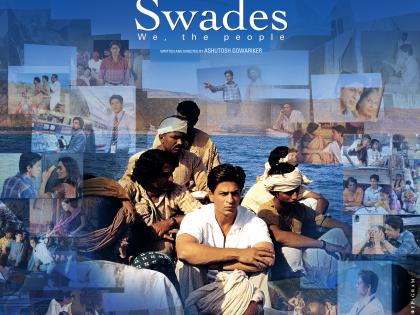"Swades," directed by Ashutosh Gowariker and released in 2004, is a critically acclaimed Indian film that seamlessly blends themes of patriotism, social responsibility, and personal growth. The film stars Shah Rukh Khan in the lead role, supported by a talented ensemble cast, and is celebrated for its poignant storytelling, compelling characters, and powerful messages. Set against the backdrop of rural India, "Swades" explores the journey of an NRI who returns to his homeland with a renewed sense of purpose. The film’s cultural significance extends beyond entertainment, inspiring conversations about development, identity, and the role of citizens in nation-building. With its heartfelt narrative and social commentary, "Swades" remains a noteworthy film in Indian cinema, resonating with audiences and critics alike. This article delves into the various facets of "Swades," from its plot and characters to its thematic depth and lasting impact.
Overview of the Film Swades and Its Cultural Significance
"Swades" is a film that captures the essence of India’s socio-cultural fabric while emphasizing the importance of grassroots development. The title "Swades" translates to "Homeland," reflecting the film’s core message about patriotism and the responsibilities of citizens towards their country. The film’s narrative underscores the idea that true patriotism involves active participation in societal progress rather than mere emotional attachment. It highlights rural India’s challenges and the potential for change when individuals take initiative. The film’s portrayal of village life, traditional values, and modern aspirations offers a nuanced perspective on India’s diverse cultural landscape.
Culturally, "Swades" is significant for its portrayal of rural empowerment and the importance of education, self-reliance, and community collaboration. It challenges urban-centric narratives by emphasizing the strength and resilience of rural communities. The film also encourages viewers to reflect on their own roles in societal development, fostering a sense of collective responsibility. Its messages resonate deeply in a country where development disparities between urban and rural areas persist. The film’s success and critical acclaim have cemented its place as a socially conscious cinematic work that advocates for change through individual initiative, making it a landmark in Indian cinema’s tradition of socially relevant storytelling.
Furthermore, "Swades" is appreciated for its authentic representation of Indian traditions and values, showcasing a respectful and nuanced view of rural life. It bridges the gap between urban aspirations and rural realities, promoting understanding and empathy. The film’s emphasis on cultural pride, combined with its call for active citizenship, elevates its significance in India’s ongoing discourse on national identity and development. Its influence extends beyond the silver screen, inspiring social and developmental initiatives aimed at rural upliftment. As such, "Swades" holds a special place in the cultural consciousness of India, serving as both a mirror and a catalyst for societal reflection and change.
Plot Summary: A Journey of Self-Discovery and Patriotism
"Swades" follows the story of Mohan Bhargava (Shah Rukh Khan), an accomplished NASA scientist working in the United States. Despite his professional success, Mohan feels a void within, driven by a sense of disconnect from his roots. When he learns about his childhood nanny, Kaveri Amma, living in a remote Indian village, he embarks on a journey back to his homeland, motivated by a desire to reconnect with his cultural heritage and contribute meaningfully. Upon arriving in the village, Mohan witnesses the hardships faced by the villagers, including lack of electricity, education, and basic infrastructure.
Throughout his stay, Mohan becomes deeply involved in the community’s struggles and begins to understand the importance of grassroots development. He collaborates with local villagers, including the village head, Gita, and the young boy, Chikku, to initiate sustainable projects such as solar power and education for children. His efforts are met with various challenges, from bureaucratic hurdles to ingrained social practices, but his determination fuels progress. The narrative explores Mohan’s internal conflict—between his life abroad and his newfound sense of duty towards his homeland—and his evolving understanding of patriotism as active service.
As the story unfolds, Mohan’s journey transforms him from a detached outsider to an invested member of the community. His love for his country deepens, and he recognizes that real change begins with individual responsibility. The film culminates in a collective effort to improve the village’s infrastructure, symbolizing hope and progress. Mohan’s personal growth mirrors the broader message that patriotism is not just about emotional sentiment but about tangible contributions to society. His journey of self-discovery underscores the film’s overarching theme: the power of committed individuals to inspire societal change.
Key Characters and Performances in Swades
Shah Rukh Khan delivers a nuanced performance as Mohan Bhargava, capturing the character’s internal conflict and transformation with subtlety and conviction. His portrayal reflects the complexity of an NRI grappling with his identity, sense of duty, and emotional ties to his homeland. Khan’s expressive acting brings depth to Mohan’s journey from detachment to active engagement, making him a relatable and inspiring protagonist.
Girish Karnad plays Kaveri Amma, Mohan’s childhood nanny, embodying warmth, wisdom, and unwavering love for her adopted son. Her character symbolizes the emotional core of the story, representing the roots and traditional values that Mohan seeks to reconnect with. Karnad’s performance adds emotional weight and authenticity to the narrative.
Gayatri Joshi’s portrayal of Gita, the village schoolteacher and Mohan’s love interest, is both gentle and inspiring. She embodies resilience and hope, highlighting the role of education and women’s empowerment in rural development. Joshi’s performance emphasizes the film’s message of progress through collective effort and education.
Supporting characters, including the village head (played by Rajesh Vivek), the young Chikku, and other villagers, contribute to the film’s rich tapestry of personalities. Their performances bring authenticity to the rural setting, portraying a spectrum of social realities with dignity and nuance. The ensemble cast collectively underscores the film’s themes of community, responsibility, and cultural pride, making "Swades" a compelling study of human connections and societal change.
Director Ashutosh Gowariker’s Vision and Filmmaking Approach
Ashutosh Gowariker’s vision for "Swades" was rooted in creating a socially relevant film that would inspire viewers to reflect on their roles in nation-building. Known for his meticulous storytelling and attention to detail, Gowariker aimed to depict rural India authentically while emphasizing the importance of grassroots development. His approach combined realistic portrayals with emotional storytelling, creating a narrative that was both engaging and meaningful.
Gowariker’s filmmaking approach involved extensive research into rural life, ensuring that the film’s settings, costumes, and dialogue resonated with authenticity. He collaborated closely with local villagers and consultants to accurately portray their lifestyle, culture, and challenges. This dedication to realism contributed to the film’s credibility and emotional impact. Gowariker also focused on strong character development, allowing audiences to connect deeply with Mohan’s internal conflict and growth.
Visually, Gowariker employed natural lighting and realistic cinematography to evoke a sense of intimacy and immediacy. His use of wide shots captured the scenic beauty of rural India, contrasting the simplicity of village life with the technological world Mohan comes from. The director’s emphasis on storytelling through character arcs and social themes elevated "Swades" beyond mere entertainment, positioning it as a call to action.
Moreover, Gowariker’s integration of music, dialogues, and symbolism reflected his holistic vision of a film that educates and inspires. His approach demonstrated that cinema could serve as a powerful medium for social change, reinforcing the film’s message that individual effort can ignite collective progress. Through "Swades," Gowariker reaffirmed his reputation as a filmmaker dedicated to socially conscious storytelling that respects cultural roots while advocating for development.
Themes Explored in Swades: Identity, Responsibility, and Change
"Swades" explores profound themes centered on personal and societal transformation. One of the central themes is identity—particularly the tension between one’s roots and the modern world. Mohan’s journey symbolizes the rediscovery of cultural identity, emphasizing that understanding and embracing one’s heritage is vital for meaningful progress. The film suggests that true patriotism involves recognizing and valuing one’s cultural roots while actively contributing to societal betterment.
Responsibility is another key theme, portrayed through Mohan’s evolution from a detached scientist to an engaged citizen. The narrative underscores the importance of individual accountability in addressing social issues such as education, infrastructure, and rural development. It advocates that change begins with a sense of duty and the willingness to take initiative, rather than waiting for external forces or government intervention.
Change, both personal and societal, is depicted as a gradual but achievable process. The film emphasizes that sustainable development requires collective effort, innovation, and perseverance. It highlights the idea that even small acts—like installing solar panels or teaching children—can lead to significant transformations in rural communities. The film promotes a message of hope, resilience, and proactive engagement, inspiring viewers to believe in their capacity to make a difference.
Additionally, "Swades" addresses themes of cultural pride, community solidarity, and the importance of education. It advocates for a balanced integration of tradition and modernity, suggesting that progress does not mean abandoning cultural values but rather enhancing them through responsible action. These themes collectively forge a compelling narrative that encourages self-reflection and social consciousness among audiences.
Cinematic Techniques and Visual Storytelling in Swades
Ashutosh Gowariker’s direction employs a range of cinematic techniques that enhance the storytelling and emotional resonance of "Swades." The film’s cinematography, led by Anil Mehta, captures the scenic beauty of rural India with sweeping wide shots, lush landscapes, and intimate close-ups that evoke a sense of authenticity and connection. The natural lighting and earthy color palette reinforce the realistic tone, immersing viewers in the village setting.
The use of symbolism is prominent



